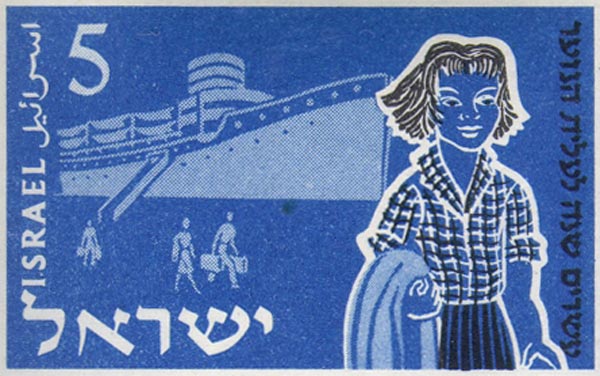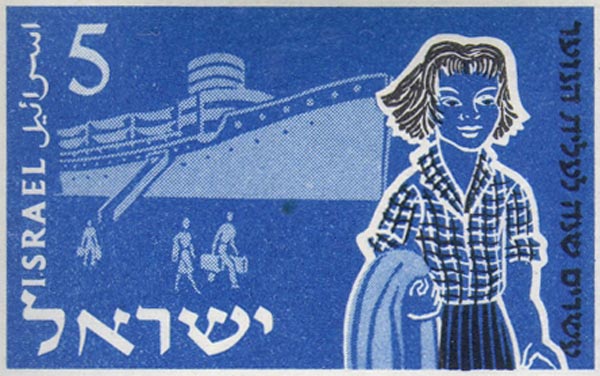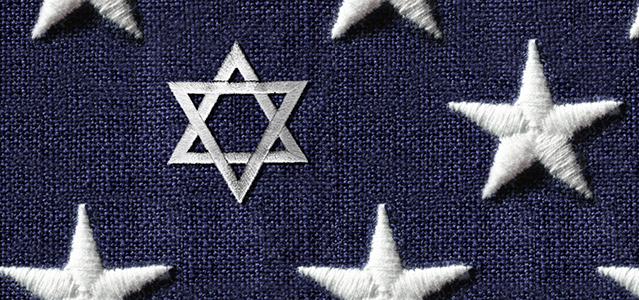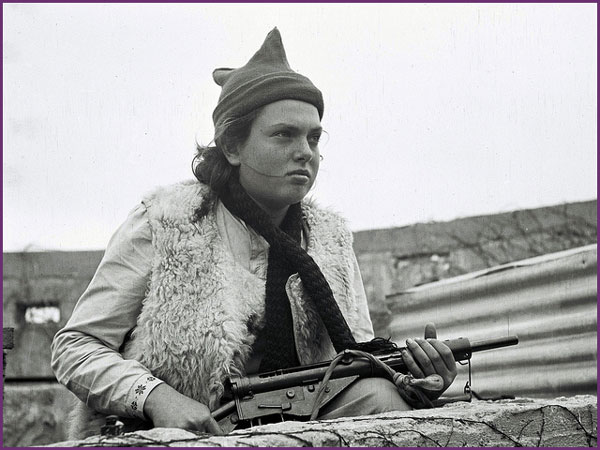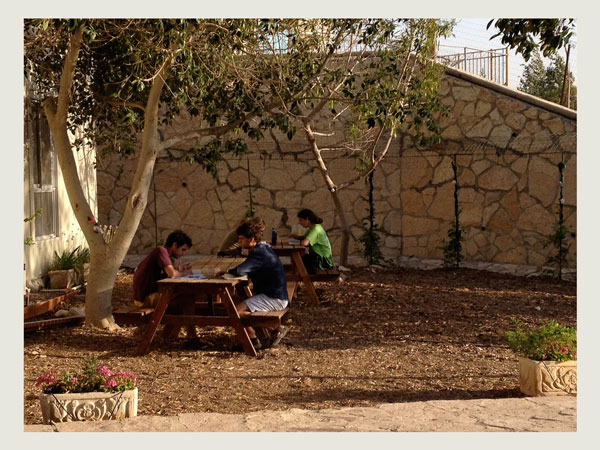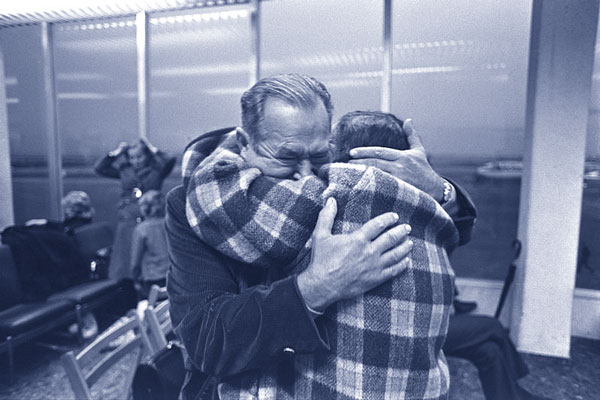It’s happened at least a half-dozen times. Somewhere—at a social gathering, after a speaking engagement, while sitting in a café—someone has come up to me and said, “You know, the reason I’m living in Israel is Letters to an American Jewish Friend.” The same is true of some portion of the reactions to the book that I received in the mail, the bulk of them in the early years after its initial publication in 1977. Of them all, the most memorable was a postcard from 1986. On one side was a photograph of Jews praying at the Western Wall in Jerusalem. On the other, next to my address, was written:
Hillel Halkin:
Thank you for helping me find my way home.
AN AMERICAN ISRAELI JEWISH FRIEND
There was no signature.
Today, re-reading the book from cover to cover for the first time since writing it, I ask myself why it had such an effect on some people. I suppose its epistolary form had something to do with it. It drew readers in; many responded with letters of their own. Not all of these agreed with me. From my point of view, disagreement was almost as good. I had never thought I could convince American Jews to move to Israel by writing a book. I had thought I might help start an argument that was missing from American Jewish life.
1. The Imperative
The argument I had in mind wasn’t about Zionism per se. Jewish backing for Israel was rarely challenged in the 1970s; only later did some American Jewish intellectuals on the political Left begin to question not just the wisdom or morality of this or that Israeli policy but the very idea of a Jewish state. Yet I would not have argued with such people in Letters to an American Friend even had they been more common at the time. I didn’t write the book to defend Israeli policies, and I have never believed that, as a Jew, I should have to make the case for Israel’s existence to anyone. Whoever disputes it deserves to be scorned, not reasoned with.
But the Zionist consensus of the organized American Jewish community in the 1970s was of a peculiarly American kind. It had rejoiced in Israel’s establishment; it took pride in Israel’s accomplishments; it celebrated Israel’s military victory in the Six-Day War of 1967 and gave thanks when Israel beat back its enemies in the Yom Kippur War of 1973; it acknowledged that its own fate and Israel’s were intertwined. Yet it did all this from a vicarious distance. Unlike the European Zionism that led to Israel’s creation, it was not a movement of self-actualization. It was one of helping others, of philanthropy and political support.
It had always been like that. From the outset, American Zionism viewed a Jewish state as a home for Jews less fortunate than America’s—for those fleeing the Europe of the Czars or Hitler, for Holocaust survivors in the DP camps, for refugees from the Arab countries of the Middle East, for Soviet Jews imprisoned behind the Iron Curtain. Its task, as it saw it, was to assist these victims of fate or anti-Semitism to reach a Jewish homeland and be absorbed there in a secure and prosperous environment; it was not to encourage American Jews to join them. Although there were tiny American Zionist youth groups that preached and practiced aliyah, emigration, the subject was never on the American Jewish agenda.
The statistics reflected this. Between 1948 and 1964, an American Jewish community of close to six million produced an annual average of some 300 immigrants to Israel. That figure rose somewhat in the mid-1960s and, then, under the impact of the Six-Day War, jumped dramatically to nearly 8,000 annually in the years 1969-1972.
My wife and I, when we moved to Israel from New York in 1970, belonged to this surge. The war hadn’t created a sudden awareness of Israel in either of us. I had grown up in a strongly Zionist home, first visited Israel during the summer I was eighteen, and returned for a longer stay several years later. My wife, also in her late teens, had spent an entire year in Israel, falling in love with the country and returning a second and a third time. We both knew Israel well. Each of us, independently, had considered living there.
But at the time of our marriage, we were both deep into our American lives, and Israel was not in the forefront of our thoughts. It was pushed back there by the 1967 war and all that surrounded it: the fearful anxiety preceding it, the jubilant relief when it was over, the realization of how much Israel had continued to mean to us even as we were thinking of other things. We traveled there as tourists in the summer of 1968—a brief description of this trip can be found toward the end of Letters to an American Jewish Friend—and left with the understanding that we had to make up our minds. We were still young enough to do with our lives what we wanted and old enough to know we wouldn’t always be. Either we were going to live in Israel or we weren’t. Less than two years later, we decided.
I don’t remember thinking at the time that our decision made us part of a wave. Or rather, if it did, the wave was of young New Yorkers like ourselves, products of the 1960s, leaving a city we had had enough of for the challenge and excitement of other places. Some went to live in rural New England or New Mexico; we moved to Israel. The life we chose for ourselves did not seem so different from what others were choosing in America. Soon after arriving, we bought land in a small farming village and set about building a house on it.
Once we did arrive, though, we became aware that we were also part of something else. The country was full of young American Jewish immigrants like ourselves. The Six-Day War had affected them as it had affected us. For a moment it almost seemed that the one thing American Jewry had never wanted to talk about—a large American Jewish aliyah—was actually taking place. The pride and excitement of being in its avant-garde were joined to the energy and optimism that prevailed in Israel in those years, when the exhilaration of the 1967 victory had not yet entirely worn off and a more sober awareness of the problems following in its wake was only beginning to sink in.
Sobriety came with the Yom Kippur War. Israel emerged from the war’s three weeks a different country—grieving, bewildered, its confidence shaken. The triumphalism of the post-1967 years vanished all at once. The economic boom came to an end. Immigration from America fell sharply, too, dropping to 5,000 in 1973, decreasing again in 1974, and in 1975 returning to its pre-1967 level. The mass aliyah never materialized.
I wasn’t in the army during the war, not being inducted and doing my basic training until the summer of 1974. But the country was then still on a semi-wartime footing, and during my first year of reserve duty I was in uniform for two months in an infantry battalion. We had a small baby and had just moved into our new house, with no telephone because no lines were available, and it was a difficult time. I was angry that I had to be away from home so much. So was my wife.
In general, Israel was an angry place then. It was still licking its war wounds. Taxes had been raised on everything to meet the war’s costs, and Israelis were struggling to make ends meet. The future looked bleak; a new outbreak of fighting seemed likely. The balance of power in the Middle East had shifted. America, Israel’s best friend, was now also the patron of an Egypt weaned from Soviet influence. As details emerged of the failures of political leadership and military intelligence responsible for the initial Yom Kippur debacle, a groundswell of protest spread. In November 1975, the United Nations “Zionism is Racism” resolution came as a brutal kick to a country that was already down. Israelis felt abandoned, misunderstood.
American Jews, though sympathetic, were detached. Israel was no longer the can-do-no-wrong country it had been for them in 1967. It was certainly no longer a country to consider living in. When friends visited from the U.S., the subject wasn’t raised. They came for their summer vacation, or part of it, and went home while I went back to another month of reserve duty and the worry of paying bills.
I was bearing a burden my friends weren’t; more and more, it felt like the burden of Jewish history. I didn’t say this to their faces. I should be grateful, I told myself, that they bothered to visit at all. But had I been truthful, I would have said other things. And so I wrote Letters to an American Jewish Friend.
2. My Correspondent
“Yet what of such typically Jewish behavior do you find in Israel today? You know the answer as well as I do. Oh, Israelis are quick enough to protest when they feel that they themselves have been wronged—if anything, too quick!—but try suggesting to them that they might care as much about wrongs done to others, especially at their own hands, and you will get a pitying look for your innocence. For the first time in our history, realpolitik has replaced Jewish ethics as a way of life. Is the moral that . . . if power is morally corrupting, the greatest possible corruption for a people is having a state of its own?”
—A., in Letters to an American Jewish Friend, p. 80
I’ve been asked whether “A.”, my correspondent in the book, was a real person. The answer is that he was a composite of several real people. They were indeed friends. Like me, they had come of age in the 1950s and 60s, and they represented the best in American Jewish life. They cared deeply about Judaism, about the Jewish people, about Israel. Many had been to Israel more than once. They just didn’t think of living there. It didn’t occur to them that they should.
It was this that bothered me the most. Had any of them said, “Look, I know that as a Jew I belong in Israel, but it just isn’t possible for me,” I would have forgiven them immediately. There are all kinds of good reasons for not leaving everything for a new country. One might have a profession or career for which no good opportunities exist elsewhere, or elderly parents one can’t leave by themselves, or a dozen other perfectly valid excuses. I wasn’t asking for heroic sacrifice. I hadn’t made one myself. Life in Israel was difficult, but it was also rich and rewarding and I wasn’t a hero for choosing it.
What I was asking for was honesty: the honesty to face a historical situation and draw the right conclusions. These seemed obvious to me. It was obvious that, entering the last quarter of the 20th century, the state of Israel was the most—the only—meaningful future the Jewish people had; that this state’s existence could be ensured solely by the Jews living in it; and that it was therefore the most meaningful place for a Jewish life to be lived. I had no quarrel with Jews who didn’t care about meaningful Jewish lives. There were millions of them in America. The name for that was assimilation—and since Zionism had always regarded assimilation in the modern Diaspora as inevitable, it would have been absurd of me, as a Zionist, to argue against it. Some of my American Jewish friends were assimilated, too, but Letters to an American Jewish Friend wasn’t written to them.
My quarrel was with American Jews who did care deeply about being Jewish. I didn’t doubt that they were as committed to their Jewishness as I was to mine. I didn’t think that living in Israel made me a better Jew. I thought it made me a more logical one. It gave my life as a Jew its maximal value.
This was what I tried to convince “A.” of. Was I also trying to convince myself?
Perhaps. Not that I was having second thoughts. There was no room for those. When my wife and I had decided to move to Israel, we had decided to move for good. We didn’t say to ourselves, “If we like it, we’ll stay.” We were staying. That was clear from the start.
As we discovered, this made our adjustment simpler. Others did it differently. They came for a trial period. Why burn their bridges? That would only, they thought, make their lives in Israel more stressful.
It was just the opposite. Every day was another test for them. Their new neighbors had invited them for dinner? Israelis were wonderfully friendly. The family next door didn’t say hello on the stairs? Israelis weren’t friendly at all. The man in the government office was polite and helpful? Israeli bureaucracy wasn’t so bad. He was rude and argumentative? Israeli bureaucracy was intolerable. They kept an open ledger in which there were new entries all the time and the bottom line kept changing. Many returned to America in the end.
We avoided all that. When you know something is permanent, you make the best of it and sometimes even come to see its good side. (Israeli bureaucrats were actually the world’s most humane. That’s why they argued with you instead of simply saying “Next!”) I don’t remember a single moment in which I regretted what we had done, possibly because regret would have been beside the point.
And yet there were moments in which I needed firming up. Talking with my American Jewish friends, I sometimes felt a twinge of envy. Life was so damned easy for them. The second car they thought nothing of owning. (We could barely afford a first one.) The weekend house on ten acres in the country. (Ten acres? We were considered estate owners for having bought three-quarters of one acre.) The vacations abroad. (In Israel there was something called a “travel tax” that charged you a fortune just for the right to buy a ticket to anywhere.) Things like that. I needed to reassure myself, not that I had good reasons for being where I was, but that I had better reasons than they had for being where they were.
In this sense, Letters to an American Jewish Friend was addressed to myself, too. I had no trouble putting myself in A.’s place. I knew his arguments. They were, allowing for the changed times, the same arguments American Jews had always used to explain why life in Israel wasn’t for them. I thought these were evasions, rationalizations. But then American Jewish life had always seemed to me one big rationalization. Even as a boy, it had always struck me as a kind of play-acting. Israel was genuine. Jews were fighting there for a country of their own, living in it, building and defending it. In America, they were listening to sermons. What did it matter if these were the sermons of rabbis, intellectuals, political activists, social reformers, or poets and novelists? From the time I was little, I instinctively wanted no part of it. Living as a Jew in America never made any sense to me. I loved America for many things, but not for its Jewish life, to which I couldn’t see myself belonging if I remained an American.
But this was, as I have said, an instinctive reaction, a thought only partially thought through. Now, in Israel in the mid-1970s, I needed to think it through to the end. Letters to an American Jewish Friend was a way of doing this. It forced me to make the coherent argument for life in Israel that I had never bothered to make even to myself. Letters to a friend, especially if he was given an occasional chance to respond to them, seemed a good way of doing this. The give-and-take of argument could be reproduced in them and I would be kept honest by having an adversary I would have to think for; although he was my fictional creation, he wouldn’t let me get away with anything. In re-reading Letters to An American Jewish Friend today, I take some pride in the fact that he didn’t.
3. The Reception
. . . . .
But if there is no such thing as Jewish ethics, there is such a thing as the ethics of Jews, that is, the social behavior of Jewish communities judged by universal ethical standards—and it is precisely here that the greater ethical seriousness of being an Israeli rather than a Diaspora Jew lies. For what seems to you the ethical advantage of living in the Diaspora, namely, the marginality and lack of sovereign power which sensitize the Jew to the sufferings of others while saving him from the sin of mistreating them, seems to me the very opposite. . . . Where the possibility of sin does not exist, innocence is no virtue.
The abuse of national sovereignty may be, as you say, the ultimate form of corruption for a people; but just as an individual who does not go out into the world and dirty his hands with its business because he deems it unworthy of him, . . . so a people that lacks the responsibility of sovereignty remains ethically incomplete as well. And if this has been true historically of Diaspora Jewry, which never had the option of sovereignty yet was organized in semi-autonomous bodies that were empowered to make fateful decisions about themselves, how much truer is it of a voluntaristic and authority-less body like the American Jewish community today. It is easy to understand how under such circumstances, especially if accompanied by the anodynes of affluence and security, a community’s ethical conscience can turn outward, away from its own atrophied self; but the ethics of philanthropy, of tzedakah, when practiced as a form of self-distraction (and you are right that no people has so indulged itself in modern times as we Jews) are ultimately a sham.
What then is all your talk of a Jewish obsession with justice but hypocritical mouthing of words if you decline the opportunity to express it in a Jewish state of your own?
—Hillel, in Letters to an American Jewish Friend, pp. 96-99
The response to Letters to an American Jewish Friend when it was published surprised me. It was far livelier than I had thought it would be. There were many reviews in prominent places, including essay-length ones in two intellectually prestigious venues, Commentary and the New York Review of Books. Although the book didn’t sell very well, this was only because it wasn’t available, the publisher being a small one that didn’t know how to place it in bookstores. It did, however, have quite a few readers, who passed it from hand to hand like underground literature. I knew of people who borrowed it from someone who had borrowed it from someone else who had borrowed it from still someone else.
Not all of the many dozens of letters I received—often lengthy ones—took sides for or against. There were readers who simply wanted me to know that I had made them think about something they had never thought about before. Some were quite eloquent. Many said they felt spoken to by me personally.
Sometimes it was uncanny. Following the book’s publication, I went on two American lecture tours. My talks were mostly well-attended. One took place at a university in the Midwest. During the question period, a student in the back rose to take issue with me. How, he asked, could I expect sophisticated American Jews like him to live in a backwater like Israel? He had once spent a few weeks in Afula, a small city in the Valley of Jezreel, and had been appalled by its provinciality.
“And Topeka, Kansas is less provincial?” I countered.
For a second, he just stood there. “How did you know I grew up in Topeka?” he asked when he found his voice.
If it wasn’t telepathy, it was pure coincidence. But my book had touched a sensitive nerve. There were, it seemed, more Jews in America bothered by the issues it raised than was indicated in the statistics of aliyah. American Jews didn’t talk about aliyah publicly, and perhaps not even very much privately, but the subject hung over at least some of them: as a rebuke, as a challenge, as an interrogation of their beliefs, as a set of questions about Jewish existence, as a reminder that they owed themselves an accounting that had yet to be given.
I had no idea how many such Jews there were. I only knew that some of them had gone to the trouble of getting hold of Letters to an American Jewish Friend, and reading it, and lending it to their friends, and discussing it with them because it said things no one else was saying. These were not particularly original things. Classical Zionism had said them all along. I was simply applying them to the reality of the 1970s.
And yet if I had hoped to help change the American Jewish agenda, I was foolishly naïve. Aliyah did not become part that agenda, and Letters to an American Jewish Friend faded from public sight within a few years. Although it continued to attract readers, there were fewer and fewer of them. As the 1980s merged into the 1990s, American Jews were into other things: New Ageism, feminism, gay rights, environmentalism, multiculturalism—the whole parcel of social and political liberalism that most of them subscribed to. Whatever did not come under its rubric mattered steadily less to them. Support for Israel ceased to be, as a commentator had famously called it in the 1970s, the “civil religion” of American Jews.
In part, this was because no community can live vicariously through another community for very long; either it finds raisons d’êtres of its own, or it ceases to be relevant to itself. In part, it was spurred by illiberal developments in Israel. The ongoing occupation of the territories conquered in 1967, the continued rule over the Palestinians, the spread of the settlements, the increasing strength of the nationalist Right, the Israel-initiated 1982 war in Lebanon, the rigid Orthodoxy of Israel’s religious establishment—all of this made Israel a more difficult place for liberals to identify with and a more embarrassing one to be identified with. It wasn’t just its provinciality that now made it unattractive. For many American Jews, it was the perceived injustice and immorality of life in it as well.
Of course, I had argued in Letters to an American Jewish Friend that the justice or morality of life in Israel had nothing to do with the question of where a Jew should live. One did not choose a new homeland, or remain in an old one, because it was moral or just. One chose it by asking oneself this question: “Since morality and justice are important to me, where do I most want them to exist and where should I be living a life consistent with them?” For a Jew who took his Jewishness seriously, I had said, the answer was: in a Jewish state.
But this was not something that American Jewry was any longer in a mood to hear. Sometime in the 1990s (I forget the exact date), the publisher of Letters to an American Jewish Friend informed me that it was letting the book go out of print. I could, if I wished, purchase the remaining copies at a discount. I didn’t bother to respond.
4. What I Got Wrong—and Right
—Hillel, in Letters to an American Jewish Friend, p. 182
Re-reading Letters to an American Jewish Friend today, I’m pleased to see that I still agree with nearly all I said there.
There were, of course, things I got wrong. I underestimated the vitality of some sectors of American Jewish life. I didn’t take into account the extraordinary growth, both in Israel and America, of the Orthodox and ultra-Orthodox communities, or deal with the implications of this development. (One implication is that, as opposed to the 1970s, today’s trickle of American Jewish immigration to Israel has a largely Orthodox character.) I had no inkling that nearly a million Russian Jews would soon arrive in Israel. I didn’t foresee major developments in the Middle East and in Israeli-Arab relations: the peace treaty with Egypt, signed a few years after my book was written; a similar treaty with Jordan; the Oslo Agreements; the rise and spread of radical Islam and the Iranian nuclear program, let alone the “Arab Spring” and its aftermath. Who, in 1975, did?
But mostly, I think, I got it right. I was right that assimilation in America was an unstoppable force and that the American Jewish community was in a long-term process of contraction. (I might perhaps have spared my readers a few statistics, but some things called for more proof in the 1970s than they do today.) I was right that Israel would become the pivot of world Jewish life, displacing for all the world’s Jewish communities except America’s the old bipolar model of Israeli/American Jewish parity. I was right that no peace agreement would put an end to Arab grievances against Israel or to the Arab-Israeli conflict. I was right that whatever happened in this conflict, Israel would remain demographically imperiled and would need every Jewish immigrant it could get. I was right that Israel’s ultimate survival was far from assured.
These were by no means uniquely my opinions. Many others shared some or all of them. At the time I wrote Letters to an American Jewish Friend, however, they were not the accepted wisdom in the American Jewish community.
Is this enough to create an audience for the book now, when it is being republished? I honestly don’t know. What I wrote then may still be true today—may be truer than ever—but that doesn’t mean a readership exists for it. How many American Jews still care enough about Israel to be willing to engage a reasoned call on them to live there?
Quite possibly, fewer than in 1977. Yet perhaps, as then, I will be surprised. Perhaps now, too, among more American Jews than are visible, there is a hidden unease with the Jewish lives they are living or not living. Perhaps there is an unexpressed desire to make of these lives a meaningful wager. Perhaps there is a yearning to be part of a great Jewish adventure such as American Jewish life cannot provide. If there is, Letters to an American Jewish Friend will have a new generation of readers.
5. Nothing Like It in Human History
Perhaps such faith has an element of mysticism; if so, it is a mysticism based on a trust in natural process and on the belief that, as everything organic strives in this world to become or remain its own self, so does a people. Nor can I tell you with any precision what this culture will be like. . . . Neither of us, I am afraid, will see it in its “finished” form, for of all the things required for its development, none is so essential, so freely given us and yet so difficult for us to have to accept, as time. . . . As for ourselves, we must be content with the thought that we will have been part of its coming into being, like that Jewish peasant in the midrash who, when asked by a passerby whether the carob tree he was planting was intended for his children, laughed goodnaturedly and replied, of course not, no carob tree grew fast enough for that; he was planting it for the children of his children, and for their children who came after them.
—Hillel, in Letters to an American Jewish Friend, p. 197
A great adventure. I wouldn’t have missed it for the world.
There’s been nothing like it in human history. A small and ancient people loses its land and forgets how to speak its language; wanders defenselessly for hundreds, thousands, of years throughout the world with its God and its sacred books; meets with contumely, persecution, violence, dispossession, banishment, mass murder; refuses to give up; refuses to surrender its faith; continues to believe that it will one day be restored to the land it lost; manages in the end, by dint of its own efforts, against all odds, to gather itself from the four corners of the earth and return to that land; learns again to speak the language of its old books; learns again to bear arms and defend itself; wrests its new-old home from the people who had replaced it; entrenches itself; builds; fructifies; fortifies; repulses the enemies surrounding it; grows and prospers in the face of all threats.
Had it not happened, could it have been imagined? Would anyone have believed it possible? And would anyone believe it possible that one could belong to this people, value one’s connection to it, even construct one’s life around it, but have no interest in taking part in such an adventure? Would anyone believe that one could repeatedly declare how much this people means to one but think the adventure is entirely for others?
Yet this describes the average “committed” American Jew.
I don’t say that the average Israeli consciously lives the adventure called Israel on a daily basis, either. Israelis live their lives as people do everywhere. They think about their families, their work, what they will have for dinner, how they plan to spend the weekend. They don’t go about pondering the great historical drama of which they are part.
But they are a part of it. And I think there are moments in which most of them, however they may conceive of it or phrase it, realize how privileged this makes them despite all the strains and tensions of their existence. I know I do. There are few things in my life that I am as thankful for as the decision we made in 1970.
I don’t know if there will be an Israel one-hundred years from now. I don’t know if there will be one in fifty years. It depends on many things. One of them is whether you who read this book understand that the responsibility is yours, too.
I wrote it to persuade you. That was a long time ago. I hope you’re still there.
Responses
- What Has Zionism Wrought? by Hillel Halkin
Zionism is at once the greatest repudiation of the Jewish past and the greatest affirmation of it. - It’s Only Natural by Ran Baratz
Why Israel is the foundation upon which the house of Jewish culture can be most safely built. - By Our Efforts Combined by Ruth Wisse
Dear Hillel: Don’t you think that Israel needs American Jews to help it withstand the campaigns of hate it faces? - Making Jews out of Zionists by Micah Goodman
A new-old paradigm is taking place in Israel: a secularism based on a renewed embrace of Judaism. - Devaluing the Diaspora by Allan Arkush
Hillel Halkin’s scorn for American Jewry.
More about: Aliyah, American Jewry, Diaspora, Hillel Halkin, Israel, Letters to an American Jewish Friend, Zionism
